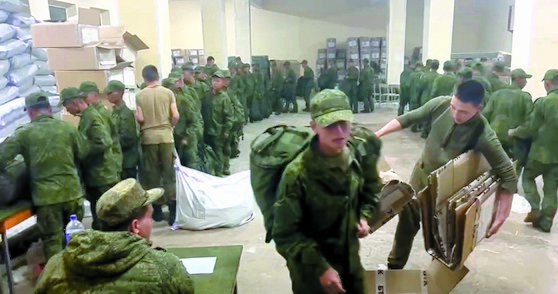“North Korean troops deployed to Russia have moved to the Kursk region over the past two weeks and completed their deployment to the battlefield,” the NIS said.
The NIS added that it is “continuing to gather and analyze additional intelligence and information related to this development.”
This comes after the United States confirmed for the first time that North Korean troops stationed in Russia’s Kursk region have begun combat operations against Ukrainian forces.

“Today, I can confirm that over 10,000 DPRK soldiers have been sent to eastern Russia, and most of them have moved to far western Kursk Oblast, where they have begun engaging in combat operations with Russian forces,” said Principal Deputy Spokesperson for the State Department Vedant Patel during a press briefing Tuesday.
The DPRK stands for the North’s official name, the Democratic People’s Republic of Korea.
“Most of them have moved to far western Kursk Oblast, where they have begun engaging in combat operations with Russian forces,” Patel said.
He further revealed that Russian forces have provided North Korean troops with training in artillery, unmanned aerial vehicles (UAVs) and essential infantry operations, including trench clearing, to prepare them for frontline duties, adding that some of the challenges they would need to overcome are “interoperability, the language barrier, command and control and communications.”
U.S. Secretary of State Antony Blinken on Wednesday further confirmed the North Korean involvement, stating that their forces have been “injected into the battle and are now, quite literally, in combat.” Speaking ahead of a North Atlantic Council (NAC) meeting at NATO headquarters in Brussels, Blinken added that this development “demands and will get a firm response.”
The U.S. confirmation aligns with earlier reports from Ukraine. On Monday, Ukrainian President Volodymyr Zelenskyy claimed that his soldiers are facing nearly “50,000 enemy troops” in Kursk, potentially including North Korean troops.
Earlier Wednesday, South Korea’s defense and foreign ministries said regarding Washington’s remarks that they were “closely monitoring developments” and that North Korean participation in the conflict remained a “genuine possibility.” A South Korean military official said it is “too early to definitively confirm North Korean engagement in combat,” indicating the need to verify further details, such as whether they are fighting on the frontline or involved in rear support roles.
South Korea’s restrained reaction contrasted with previous remarks from Seoul officials suggesting that direct North Korean involvement in combat could prompt South Korea to raise its “level” of support for Ukraine.
When asked about possible policy changes, Prime Minister Han Duck-soo said, “Nothing has been decided at this point” at a press briefing Wednesday.
Any actions South Korea takes “should be in consultation with the international community and its ally, the United States,” he added.
Concerns are rising that Russia could reward the North for dispatching troops by accelerating the transfer of military technology or weapons systems, which would present a direct threat to South Korean security. On Nov. 4, North Korean Foreign Minister Choe Son-hui paid a surprise visit to Russian President Vladimir Putin in Moscow, where both sides are speculated to have discussed specific war plans and potential timelines for reciprocal support.
Some experts are concerned about the potential for faster reciprocal support from Moscow to Pyongyang, as the two may try to take advantage of the transitional period in the U.S. administration to intensify their activities in Ukraine.
North Korea needs to “solidify the impact of troop deployment before any shifts in U.S. policy on Ukraine that may occur under Trump,” said Hong Min, a senior researcher at the Korea Institute for National Unification. “For Russia, it needs to take back the Kursk region and secure consistent support from North Korean forces before any negotiation phase begins after Trump takes office.”
![A screen capture shows soldiers, believed to be North Koreans, receiving basic supplies at a Russian training base in a video provided by the Ukrainian Center for Strategic Communication and Information Security, also known as Spravdi. [SCREEN CAPTURE]](https://koreajoongangdaily.joins.com/data/photo/2024/11/13/0329f370-9890-4dec-b243-349e9a079939.jpg)
The involvement of North Korean forces in active combat also carries domestic risks for the regime. To date, Pyongyang has not informed the North Korean public about the deployment, likely to prevent public unrest.
North Korean authorities are believed to be implementing security measures to contain information leaks regarding the deployment, according to a recent report by South Korea’s National Intelligence Service (NIS) presented on Oct. 29 to the National Assembly. Despite these efforts, information has reportedly spread among North Korean soldiers, with some expressing frustration over being asked to sacrifice themselves for another country and others fearing forced conscription, the NIS said.
Some experts believe North Korea’s intervention may provoke internal dissent among families in the country, particularly if young elite soldiers lose their lives, potentially aiding Seoul’s unification policy.
“Because elite North Korean families tend to have at most one son, the death of their son as a soldier in Ukraine means extinguishing their posterity,” said Bruce Bennett, a senior defense researcher at U.S.-based think tank RAND Corporation. “And because North Korea is very much a family-oriented society, those families will be furious with Kim once they find out that their sons have been sacrificed.”
BY SEO JI-EUN [seo.jieun1@joongang.co.kr]

![In LA Koreatown, illegal dumping lingers for months despite repeated complaints Household trash, including discarded Christmas trees, is dumped along a roadside near New Hampshire Avenue and James M. Wood Boulevard. [Sangjin Kim, The Korea Daily]](https://www.koreadailyus.com/wp-content/uploads/2026/02/0205-trash-100x70.jpg)

